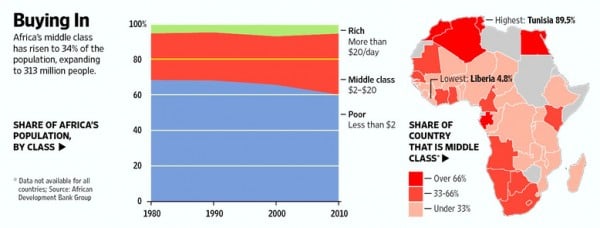
Photo Credit: www.nairiporter.livejournal.com
Ten years ago, The Economist ran a cover with the title “Africa: Hopeless Continent.” One year ago, The Economist ran a cover titled “Africa Rising.” The African Myth that the world’s longest inhabited continent is still one of seemingly infinite despair, has been proven wrong by the resilience of those who continue to populate it. Many African economies are experiencing a steadily growing middle class and the disease burden of Sub-Saharan Africa has shifted from infectious diseases to the chronic, non-communicable diseases experienced by Western populations. At times, it seems like an exquisite shock to see images of African middle-class families, instead of the usual objectifying photos of poor African babies sitting a swarm of malarial mosquitos. I’m sure readers will agree that those images actually evoke feelings of intrigue and sanguinity.
What has shaped this dramatic and somewhat precipitous shift in economic climate? One factor instrumental to the “rising Africa” is that the alleviation of infectious and life-shortening diseases has enabled an increasing percentage of the population to economically advance. Pharmaceutical companies have played a key role in this process through partnerships with NGOs, local non-profits and ministries of health. According to the popular study “Africa: a Ripe Opportunity,” published by IMS Health Solutions, most of the major pharmaceutical providers have been present in Africa for several decades. Abbott started working in South Africa as early as in the 1930s; Novartis operated in Egypt starting in 1962; and Merck, a pharmaceutical provider that believes strongly in global health responsibility, introduced their Africa program in Senegal in 1978 with a very successful public-private partnership. The very turn around that the pharmaceutical industry helped to make a reality is now proving to create their burgeoning healthcare consumer base. According to this same study by IMS, “By 2016, pharmaceutical spending in Africa is expected to reach US $30 billion.”
The topic of drug companies focusing on emerging markets to meet revenue goals, is not entirely novel. However, it’s only as of recent that the attention is shifting to African healthcare consumers. BRIC refers to the category of countries that the pharmaceutical industry initially designated as its goldmine of emerging economies: Brazil, Russia, India and China. Africa was perhaps seen more as an obligation to meet increasing corporate social responsibility demands, rather than as a prospective point of capital. So what triggered the shift? Well, according to a recent report by Reuters, “Projections called for growing middle classes in countries like China, Brazil, and India to increase demand for pharmaceutical products, but growth has fallen short of early expectations.” Furthermore, pro-business legislation across Africa has led to the U.N.’s forecast that “Foreign Direct Investment in Africa could more than double by 2014.”
According to IMS, most multinational companies find the appeal in Africa not to be in its size — “the continent accounts for just 3% of the global economy”– but in the dynamics that drive sustainable growth. At a time when the major pharmaceutical markets of Europe, North America and the BRICs hold uncertain futures, Africa is demonstrating more predictable growth and its economy is still maturing, rather than being in a point of over saturation. IMS also illustrates that Africa’s rising middle class, which accounts for 34 percent of the continent’s inhabitants, is also composing an urban population expected to exceed that of China’s and India’s by 2050.
Clearly, Africa is a mecca of opportunity for the pharmaceutical industry. It’s also clear that these MNC’s have engaged in effective public-private-partnerships throughout the better part of the last century. However, these strong economic indicators coupled with these burgeoning opportunities for pharmaceutical sales, does not mean that these companies should slow down or end their support for continued prosperity in Africa. On the contrary, this is a time for these companies to enhance their responsibility platforms with the increased visibility they’ll have through direct sales. The question has been asked as to whether or not pharma producers can profit from the same populations they once made large in-kind drug contributions to? I ask the opposing question: What programs can they continue to support in the communities that are helping to sustain their profit margins? How can these large multinational corporations partner with local pharmaceutical industries, for example, to ensure continued economic growth? How can the pharmaceutical industry shift to becoming an instrumental player in strengthening African health care systems? Non-communicable diseases will account for 46 percent of all African deaths by 2030, according to the World Health Organization. These drug companies, along with NGOs, and local healthcare providers will need to work together to be prepared.
Africa is still a land of sharp contrasts. There is indeed a rising middle class; one, however, that still lives alongside populations still struggling with diseases that are almost eradicated. There are still disparities in access to care. Africa presents to bio-pharmaceutical providers a very diverse landscape of opportunities: One in which they face massive potential for business expansion but that must be accompanied with sustained responsibility. One of the most challenging opportunities that the pharmaceutical industry in Africa will face is balancing healthcare with public health.